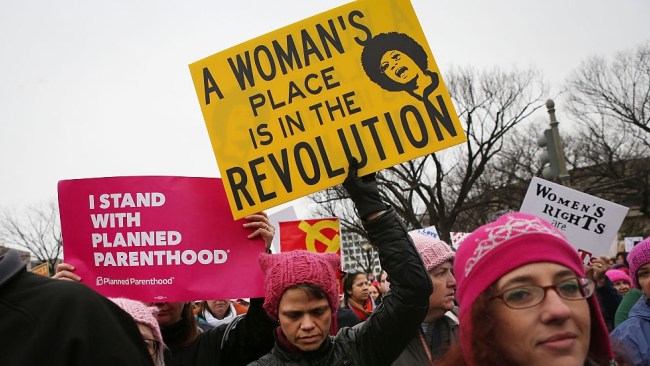
By Iyana Robertson ~The Grio
On Saturday (Jan.21), as throngs of women gathered to shout, listen and raise ironic signs in the name of “solidarity,” I felt little desire to join them — and by “them” I mean the marchers of the white variety.
The Women’s March on Washington that extended into a rallying of support by similar marches in cities all over the world was heavily supported by “them,” a “them” who has rarely had my black a** back. So to march alongside them, as Randy Jackson so eloquently put it, was a “no for me, dawg.”
Historically, white feminism is as critical of and as damaging to Black women as any other social construct in these here ‘United’ States of America. Their celebrated Women’s Suffrage Movement by-and-large was a soapbox for racism both before and after black men were given the (theoretical) right to vote *looks at Elizabeth Cady Stanton and Frances Willard*.
Fast forward to present day, and 53 percent of white women voted for Donald Trump (a stark contrast to the 94 percent of black women who voted for Hillary Clinton). These egregious inequities are the embodiment of a cold, hard truth: most white women are white first and women second. I didn’t feel compelled to stand beside them to protest a regime they had such a heavy hand in furthering.
I’m not trying to be Leslie Jones. What happened to Leslie Jones is a shining example of how black women continue to suffer at the hands of white feminism. The 2016 Ghostbusters reboot was championed as a “Punch in the D**k to All of Mankind,” bringing forth an all-female cast to offset its 1985 predecessor. As Jones took on the only black starring role in the film, the Twitter hate flooded in, with folks calling her all kinds of “apes” in 140 characters or less.
As she posted her emotional exit from Twitter amid the commentary that included insults like she was “the source of AIDS,” not one of her white co-stars – Melissa McCarthy, Kristen Wiig and Kate McKinnon – came forward in her defense. Jones was more than welcomed to champion the mainstream feminist agenda, but those who claimed to be in the trenches with her fell silent when things got real. I don’t want to march next to the Melissa’s, Kate’s and Kristen’s.
I’m good.
As I watched the Women’s March unfold on social media, several posts helped me nestle cozily into my decision not to attend:
1. This white woman who advised a Black woman to #StayOnMessage:
A black woman named Erika Totten resolved to show up to the Women’s March and remind the masses about how many white women voted for Trump. A white woman named Katie Ann Lancaster didn’t want that kind of negativity in her life.
Read the entire story here.

